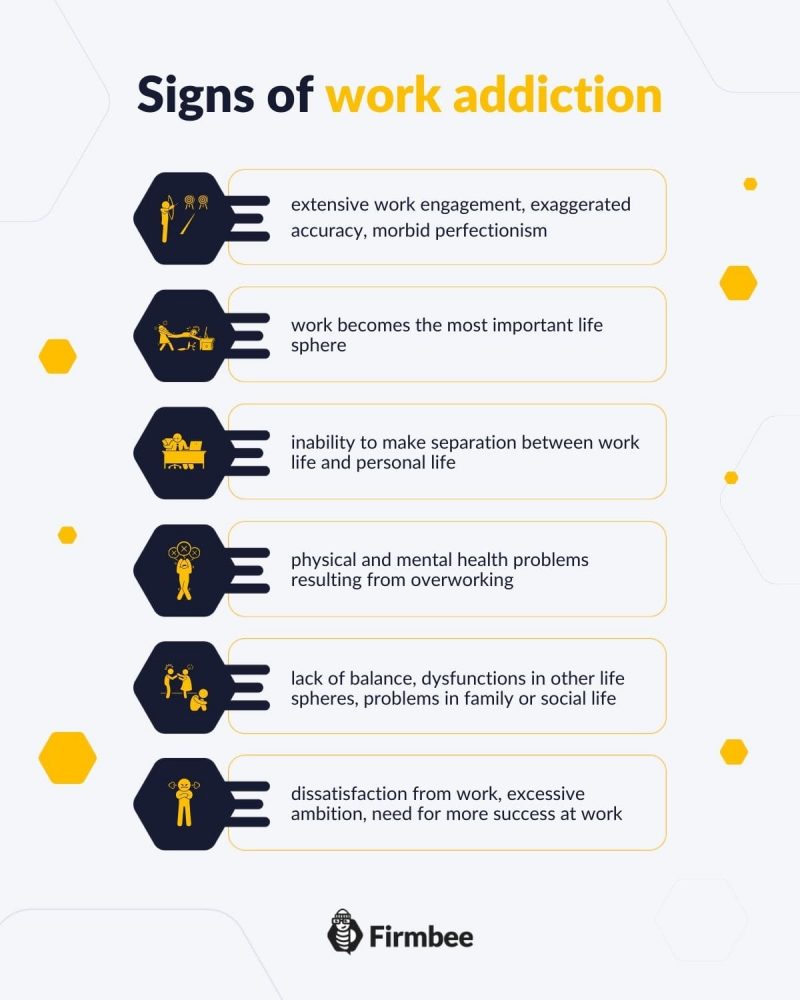Workaholism symptoms are easy to notice. Spending too many hours at work, especially when it requires great amount of attention and concentration may lead to work addiction. This mental health issue is a behavioral addiction, in which strong psychological impulses play the major role. The behavior related to the addiction – in this case concentration on work duties – affects adversely other aspects of life, such as: health and family relations.
Workaholism symptoms – table of contents:
How to recognize a workaholic?
The person addicted to work usually takes on too much responsibilities, seems to be extremely busy and intensely occupied. This person is constantly active and has no time for his family, passions, or even holidays.
The most visible symptom of work addiction is huge need to control the workplace. Quite often the work addict exhibits lack of trust for competencies and capabilities of other employees and has difficulties with delegating tasks. Therefore some of his own tasks have to be performed at home or during holidays.
The workaholic experiences stress of huge intensity during his work absence from work and generally worries than other employees may not cope with the commissioned tasks.
All the conversations initiated by the work addict focus around subject related to his duties, career field, and business industry. Work addicts think about their work all the time, they make plans, and ruminate about results and achievements – this sometimes makes them inaccessible mentally during conversions with other people. Due to the constant overthinking workaholic’s ability to retain and process information from his environment is being hindered.
Workaholism symptoms
Some common signs of work addiction include:
- extensive work engagement, exaggerated accuracy, morbid perfectionism
- work becomes the most important life sphere, all the healthy needs are being neglected, lack of interest in activities not related to work is being displayed
- inability to make separation between work life and personal life, obsessive thinking about work duties
- physical and mental health problems resulting from overworking
- lack of balance, dysfunctions in other life spheres, problems in family or social life
- dissatisfaction from work, excessive ambition, need for more success at work

Stages of work addiction
Like every other mental health issue work addiction evolves in time – the workaholic gradually looses control over his behavior. There are three stages in development of work addiction:
Initial stage is the level of work addiction, in which work addict compares himself with other employees and spends more and more time at work, where he wishes to show his abilities. In this phase some emotions such as: sadness, guilt, and fear may emerge. The addict starts to neglect his own family, has no time to take days off and works overtime.
Critical stage is the level of work addiction, in which serious problems with concentration and insomnia appear. Addicts are unable to control their behavior. They experience other mental symptoms such as: depression, apprehension, or panic attracts. Some individuals may experience heart attacks, other may be diagnosed with stomach ulcers. At this stage of addiction addicted individuals may become unable to perform his duties. Relationships with significant others may begin to deteriorate.
Chronic stage is the level of work addiction in which the life of the individual is focused exclusively on work. Addicted individuals cannot function in daily life, they neglect their basic needs for sleeping and eating. At this stage work-related death (so called: karoshi) may happen.
Healing of work addiction
Work addiction is a phenomenon which should not be underestimated. It brings detrimental effects to physical and mental health and leads to dangerous conditions such as: brain hemorrhage, brain stroke, obesity or heart attack.
The main type of treatment for work addiction is psychotherapy. In treatment for work addiction the workaholic focuses on self-acceptance hence it is usually strongly related to one’s accomplishments and other external factors. Another element of the therapy is practice of new forms of emotional expression accompanied with learning how to manage stress outside work.
The ability to balance work and life and skill of task delegation are equally important. The fight with addiction requires high and lengthy engagement of the considered individual but changes are achievable – this makes the struggle worth the effort.
Read also: Hostility in the workplace
If you like our content, join our busy bees community on Facebook, Twitter and Linkedin.
Author: Nicole Mankin
HR manager with an excellent ability to build a positive atmosphere and create a valuable environment for employees. She loves to see the potential of talented people and mobilize them to develop.


















